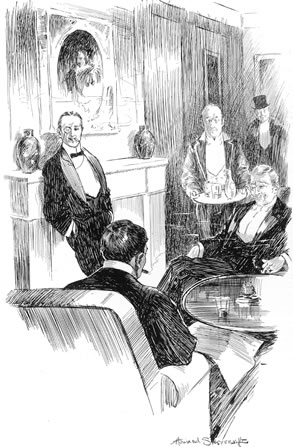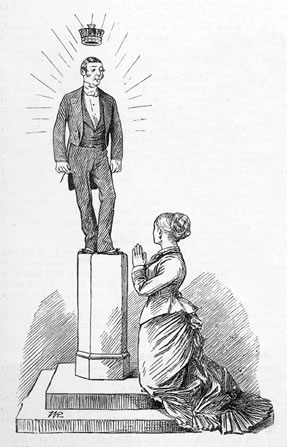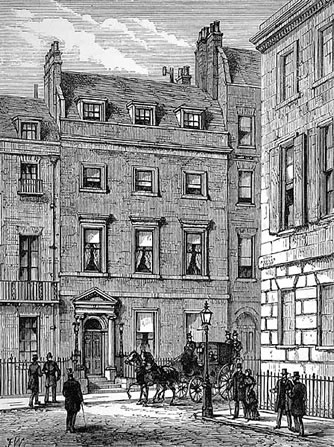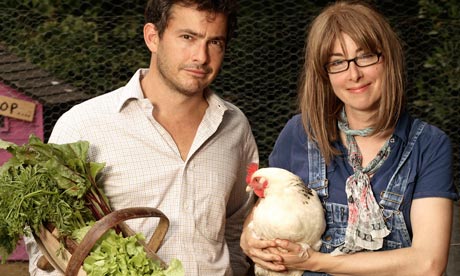
At the same time the housekeeper who rules the “still-room,” which with the kitchen provides the whole of the club food-supply, is busy like the chef in her estimate for milk, butter, eggs, fancy bread, tea and coffee, jams, pickles, olives, and sugar…As a general rule the shops supplying are within easy reach of their clubs. All other provisions are delivered in the morning, somewhere between 8 and 10 a.m.
London clubmen do not generally keep very early hours. Few houses open their doors before 9 a.m. or at best 8.30 a.m. in the summer season, by which time the housemaids, who live on the premises, have completed their house-cleaning. By 9 a.m. one or two old stagers may have collected on the steps at the grand entrance, waiting to be admitted at the regulation hour, and take their seats at once at the breakfast table to consume a meal ordered overnight. The number is limited, as a rule, and the coffee-room fills up slowly, if at all, in the forenoon, for the English set breakfast is not greatly patronised. In some clubs the second breakfast, the déjeuner à la fourchette, is popular, or is merged into an early lunch, with wine, instead of tea or coffee.
The luncheon-hour, between 1.30 p.m. and 3 p.m., is the busiest in most clubs, when men gladly escape from their offices and daily business to enjoy a little leisure and friendly intercourse. Club life is brisk in the afternoon, when members gather eager for news, to gossip, to hear the latest scandal, and pass on the last revivified “chestnut.” The tea-hour again brings in numbers who a few years ago would have swallowed their sherry and bitters, and who now prefer their mild bohea to “cocktails” or any aperatif. The increase of afternoon tea-drinking will always count as one of the strangest features of the age; it is the prevailing habit in clubs and counting-houses, in messes and common rooms, and in my lady’s chamber. The best proof of its popularity is to be seen in the extension of tea-houses, some on the most ambitious scale, and the unfailing introduction of tea at afternoon calls in private houses.
The club at dinner-time is left very much to the habitues, the members who most largely use it, with the floating population perpetually passing through…The attendance greatly differs; one night the club may be quite full, at another a howling wilderness, but some of the regular clubmen will always be in evidence, exhibiting much the same traits, finding fault generally, and all their attention concentrated upon the most important function of the day.
In every well-ordered house there is an excellent division of labour among many separate departments, each of which has its own particular staff. Taking first the kitchen, we find a chef as supreme, with a second cook and a head kitchen-maid, both of them as a rule engaged by himself…[The] head kitchenmaid takes general charge of all the female assistants, of whom there are generally half a dozen, viz. a fishmaid, two vegetable-maids, a roasting-maid, a boilingmaid, and a pastry-maid, each with her own peculiar duties. A good kitchen to be well served needs also a scullery-maid and an odd-maid, who acts as general servant or charwoman.
A useful functionary is the kitchen clerk, one of whose primary duties is to deal with the members’ dinner orders when passed down to him from the coffee-room, being generally rolled up into a ball and dropped down by a tube on to his desk. There are a dozen or two waiters, more or less, for the coffee-room, who serve in three reliefs or sides, apportioning the duties among them in turn. The first set begins work half an hour before the opening of the club, to clean and tidy up, set the tables, and remain on duty the whole day until 9 p.m., when each man is detailed in relief of others outside the coffee-room. The second side are engaged in the same way and till a later hour. The third are free all day and come on at 5 p.m., to take part in the great function of dinner-serving, when the whole strength of the staff is on duty.
One other important officer is principally concerned with the coffee-room and its proceedings. This is the wine butler, who divides his time between the care of the cellar and producing its contents for consumption…He spends long hours in the club; all the forenoon till after luncheon, and again in the evening till a late hour at night. It is his duty to keep the dispense cellar supplied with the wines in regular demand, and draw them as required form the main cellar.
The domestic arrangements of every club are very much those of any gentleman’s house. A housekeeper has a staff of housemaids under her, who begin early, often at 5 a.m., to dust and clean and prepare all parts for the opening at the customary hour. The whole of the forenoon is occupied with kitchen and offices and their own apartments, and from 3 to 5 p.m. a siesta, or going to bed for a couple of hours, is often allowed. Some are always on duty attending to crockery and plates. The still-room maids are engaged from the early morning, and must prepare…members’ breakfasts,…luncheons,…[and]afternoon tea. One still-room maid remains on duty till midnight.
The smoking-room waiters are always on duty; one, the chief, takes charge of cigars and cigarettes, and records and accounts for all sales; another is responsible for the fluids of all kinds, ready to comply with orders received. The drawing-rooms are served by one or more waiters to answer calls; the library has its own special staff, and the head, the librarian, attends to literary needs, the exchange of books forms the circulating library, the purchase and classification of standard works, the disposal of the old periodicals, the supply of writing-paper, the outfit of the writing-tables.
The card-rooms and the billiard-rooms have their own appointed staff. In both places, a certain exclusiveness is often shown. Many clubs will not admit strangers to play cards or billiards, or only in a special room or on a particular billiard-table. The money taken for games is dropped into a box and handed over to the secretary next morning. The markers regularly relieve each other, and one or more are always on duty. The waiters in those rooms have their own stocks of cigars and drinks, to answer all demands for the players.
The secretarial business of a club is elaborate and involves much book-keeping and careful accounting. The principal books embrace a cashbook, for the entry of all receipts and payments; and a ledger, in which all items are posted and classified. The weekly provision-book is an abstract of all tradesmen’s accounts, taken from their passbooks and countersigned by the heads of the two supply departments; the chef for solid food, the housekeeper for still-room supplies. In addition there is a wages-book for monthly settlement; wine books for reserve stock or dispense stock, a wine merchant’s stock-book, and ale, spirits, and mineral waters book. A careful record of all purchases is kept in the cigar stock-book, and the cigar-stock dispense-book deals with the issues to servants for sale to members. The secretary and his assistants have also charge of books concerning members’ subscriptions, the rent of chambers, where they exist, and of lockers and drawers. Full inventories are kept up of all furniture and other belongings, which are carefully examined half-yearly.
— Clubs and Clubmen (1907)





This is fascinating! Even with all the reading I do, and countless thousands of hours spent watching period drama, it never fails to astonish me when I encounter fresh details that bring to life the sheer labor it took to sustain various customs and cultures of the aristocracy and other privileged folk.
I learn new things every time I create a post for EP! 😀
And you are so right: it’s amazing how large swaths of society existed to serve the well-to-do.